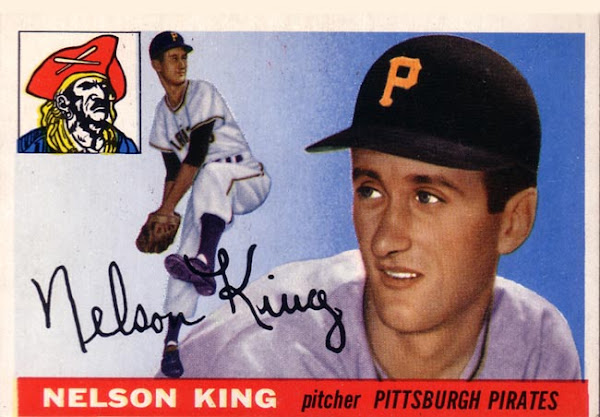 Nellie's baseball career was interrupted when he was drafted into the Army during the first month of the Korean War. He began basic training at Fort Dix, New Jersey in the autumn of 1950. Thanks to a skill he picked up at the Milton S. Hershey Industrial School for Orphaned Boys, he managed to stay far out of the line of fire.
Nellie's baseball career was interrupted when he was drafted into the Army during the first month of the Korean War. He began basic training at Fort Dix, New Jersey in the autumn of 1950. Thanks to a skill he picked up at the Milton S. Hershey Industrial School for Orphaned Boys, he managed to stay far out of the line of fire. Here is an excerpt from a chapter of his book entitled "Army Interlude":
I was twenty-two years old, pitching for the Charleston (SC) Rebels, in the Class “A” Sally League, and ripe for the military draft when the Korean War broke out on June 25, 1950. Within a month my draft board in Lebanon, PA informed me I had to report for my physical exam. Unable to travel home during the season, it was arranged for me to take my physical at Columbia, SC. The baseball season ended on Labor Day and on September 28, 1950, I was inducted into the Army at Fort Dix, NJ. It was to be another of those defining moments in my life.
After thirteen weeks of infantry basic training I learned to fire every small arms weapon used by a rifleman. I also did a lot of close order marching drills and learned why we did them one day during standing inspection as an orderly for the 60th Infantry Regimental Commander. The Lt. Colonel came up into my face and asked, “Soldier, why do we do close-order marching drills?” Drawing on my baseball team play experience, I replied, “Sir, we do it so we can learn to work together as a unit.” He loudly responded, “No soldier, you do it to learn to take orders. When we tell you to turn left, goddamnit, you turn left. When we tell you to turn right, goddamnit, you turn right. You don’t ask questions—you take orders in the Army!”
After basic training I entered a leadership training program to prepare me to be an infantry rifle squad leader, a position not known for longevity. As a cadre, I was pushing troops and also served on the Browning Automatic Rifle Committee, headed by Lt. Constantine Thomas, a veteran of WWII who was wounded in the early months of the Korean War.
One of my talents, of which the Army was not yet aware, was typing. After a day of training, Lt. Thomas remarked he needed a lesson plan typed and was concerned that nobody at Battalion Headquarters would be available to do the job. I innocently informed him I could type and he immediately took me to Battalion HQ and sat me down behind a Royal typewriter. I began to type the lesson plan, when I suddenly sensed someone was standing behind me. It was Major Jackson, the Battalion Commander. He said, “Soldier, you look like a pretty damn good typist.” I replied, “Yes, sir, I can type about 70 words per minute.” He uttered the words that changed my Army career, “We need a clerk typist at Battalion Headquarters.”
Thus ended my days as an infantryman. I spent the remainder of my two years behind a typewriter, not an M-1 rifle. No KP, no guard duty, no bivouac! I highly recommend learning typing. It’s the most under-rated job in the Army.
During those two years I was able to play baseball on the 60th Infantry Regiment baseball team. Also on the team were then unknown minor league players Frank Torre, Don McMahon, and Arnold Portacarrero. There were only two players, both young pitchers, who had played in the major leagues—Erv Palica, of the Brooklyn Dodgers pitched for the 60th Infantry, and Harvey Haddix of the St. Louis Cardinals was on the 39th Infantry team. The commanding officers of both regiments were baseball fans, which heightened the rivalry of the games.
I was to be discharged from the Army on September 28, 1952. A few weeks before that date, I received a letter from Branch Rickey, the General Manager for the Pirates. Always ahead of the curve in scouting talent, Mr. Rickey wanted to take a look at the young players from the Pirates farm system that were about to be discharged from the service. He asked if I could make it to Ebbets Field when the Pirates would be playing the Dodgers. Could I? Hell, I'd walk all the way to Brooklyn if I had to!
With two other players on the 60th Regiment team, we drove to Ebbets Field early enough to await the arrival of the Pirates’ team bus. When it arrived I introduced myself to Bob Rice, the Pirates’ traveling secretary, and showed him Mr. Rickey's letter. He was unaware of the workout and took me to the clubhouse to meet manager Billy Meyer. Surprisingly, Billy Meyer didn't know anything about the workout either, but told “Doc” Jorgensen, the team trainer, to get me a uniform. I put on a major league uniform and stepped onto a major league field for the first time that day in September 1952 at Ebbets Field.
